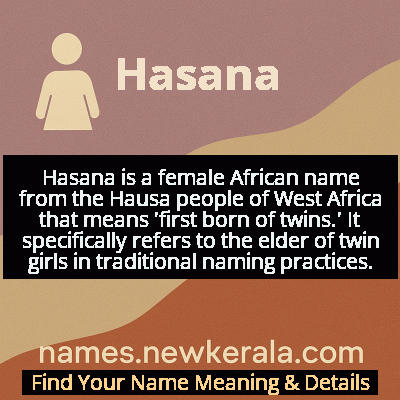Hasana Name Meaning & Details
Origin, Popularity, Numerology Analysis & Name Meaning of Hasana
Discover the origin, meaning, and cultural significance of the name HASANA. Delve into its historical roots and explore the lasting impact it has had on communities and traditions.
Name
Hasana
Gender
Female
Origin
African
Lucky Number
8
Meaning of the Name - Hasana
Hasana is a female African name from the Hausa people of West Africa that means 'first born of twins.' It specifically refers to the elder of twin girls in traditional naming practices.
Hasana - Complete Numerology Analysis
Your Numerology Number
Based on Pythagorean Numerology System
Ruling Planet
Saturn
Positive Nature
Ambitious, efficient, realistic, and authoritative.
Negative Traits
Materialistic, stressed, confrontational, and can be overly ambitious.
Lucky Colours
Dark blue, black.
Lucky Days
Saturday.
Lucky Stones
Blue sapphire, amethyst.
Harmony Numbers
2, 4, 6.
Best Suited Professions
Business leaders, managers, financial services, law enforcement.
What People Like About You
Leadership, determination, organizational skills.
Famous People Named Hasana
Hasana Aliyu
Traditional Birth Attendant
Renowned for delivering over 500 sets of twins in Northern Nigeria
Hasana Bello
Educator
Founded multiple schools for girls' education in Hausa communities
Hasana Usman
Cultural Preservationist
Documented and preserved traditional Hausa birthing practices and naming ceremonies
Name Variations & International Equivalents
Click on blue names to explore their detailed meanings. Gray names with will be available soon.
Cultural & Historical Significance
Historically, families bearing twins were often regarded as particularly blessed, and the naming convention helped establish the hierarchical relationship between the twins from birth. This tradition is part of a larger cultural framework that values family relationships and birth order, with specific names designating the first twin (Hasana) and second twin (Husaina). The preservation of this naming practice demonstrates the enduring nature of Hausa cultural traditions despite modernization and external influences.
Extended Personality Analysis
Women named Hasana are often perceived as natural leaders with strong protective instincts, reflecting their namesake role as the firstborn twin. They typically exhibit maturity beyond their years, taking on responsibilities early in life and demonstrating reliable, dependable character traits. The cultural expectation of being the 'older sibling' even by minutes often shapes them into individuals who are nurturing, organized, and naturally inclined toward caregiving roles.
Their personality often blends traditional values with modern adaptability, making them effective bridges between generations while maintaining strong family connections. Hasana's tend to be practical problem-solvers who approach challenges with determination and resilience. They often display a balanced combination of independence and community orientation, capable of taking initiative while remaining deeply connected to their cultural roots and family obligations. This creates individuals who are both grounded and progressive in their outlook.
Modern Usage & Popularity
In contemporary times, Hasana continues to be used predominantly within Hausa communities across West Africa, particularly in Nigeria, Niger, Ghana, and Cameroon. While maintaining its traditional meaning, the name has also gained some popularity among diaspora communities seeking to preserve cultural heritage. Modern usage sees the name employed even for single births, as parents appreciate its melodic quality and cultural significance, though it remains most commonly given to firstborn twins. The name has maintained consistent usage patterns without significant spikes in popularity, reflecting its status as a traditional rather than trendy name choice.
Symbolic & Spiritual Meanings
Symbolically, Hasana represents leadership, protection, and the special bond of twin relationships. The name carries connotations of being a trailblazer or pioneer, as the first twin to enter the world, symbolizing the idea of natural hierarchy within equality where both twins are equally valued but the firstborn carries specific responsibilities. Metaphorically, the name suggests someone who leads the way while maintaining deep connection to their counterpart, embodying both independence and interdependence simultaneously. This symbolism extends to representing blessed beginnings and the special nature of multiple births in cultural consciousness, making the name a powerful emblem of familial bonds and cultural continuity.

